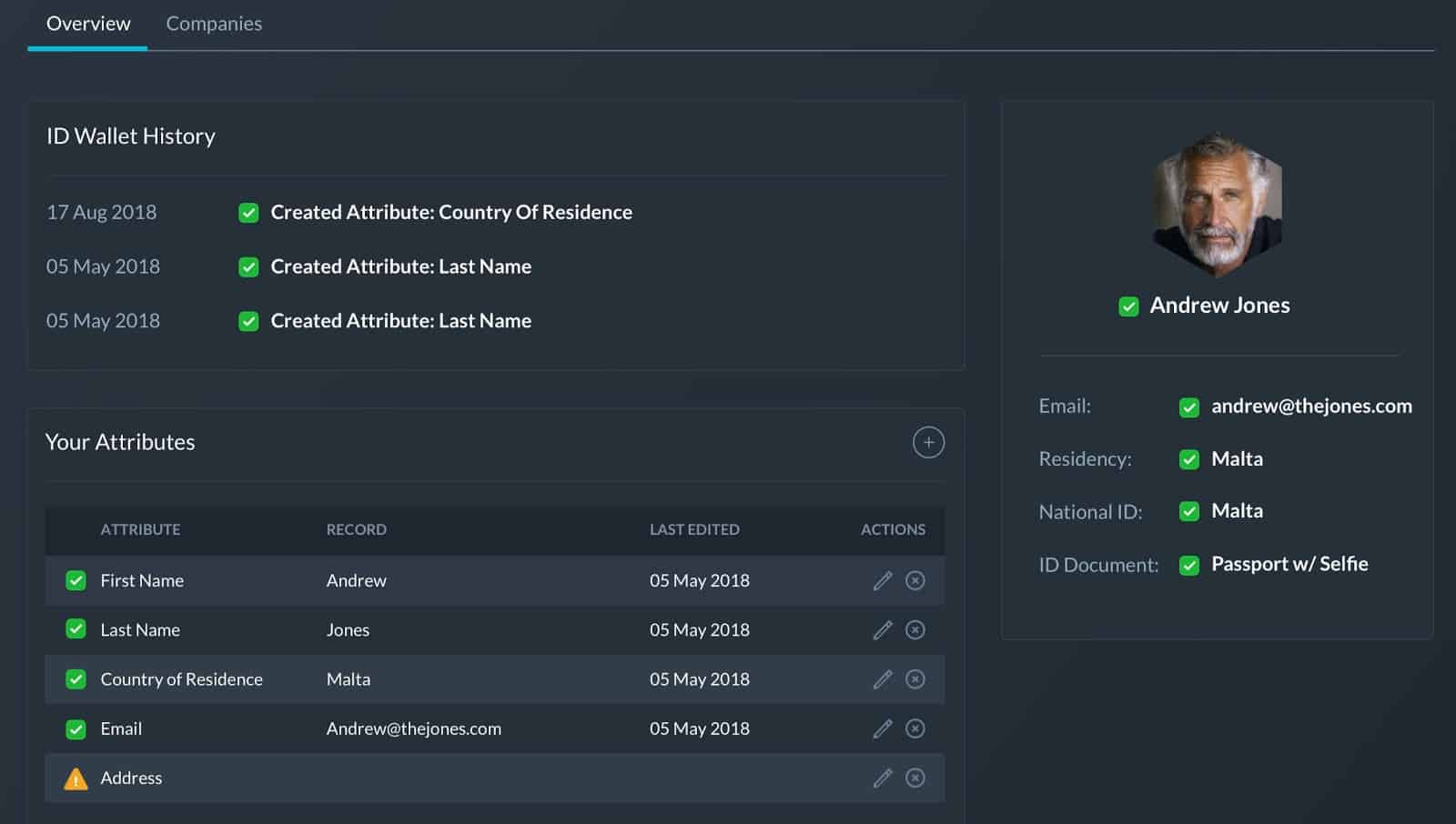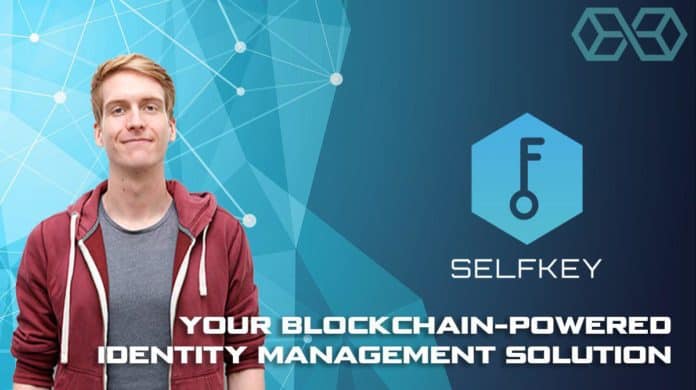Almost everyone in the world who has access to the internet or financial services will, at one point, have verified their identity online.
Sometimes, this is as simple as uploading a selfie or confirming a phone number. However, some providers, especially in finance, require complicated know-your-customer (KYC) reporting to be legally allowed to serve their customers.
Current approaches to identity management rely on service providers creating and maintaining a silo of each customers data. However, businesses typically don’t have the expertise or resources to maintain this data silo adequately.

As a result of data mishandling, hackers or even internal malicious actors can easily gain access to sensitive user data. Additionally, as data silos don’t communicate with each other, users need to share personal information every time they register for a new online account, creating multiple inefficiencies.
With the advent of decentralized technology, SelfKey, a blockchain-powered identity management solution, are putting the power back in the individual’s hands to protect online identities.
Blokt caught up with Chris Grundy, Director of Marketing at SelfKey, to find out why its decentralized solution is so unique.
What Is SelfKey?
SelfKey was founded by Edmund Lowell in 2018 to protect individuals’ self-sovereign identities online. After a successful ICO raise, SelfKey now has staff in over 20 countries, and they’re growing fast.
An open-source organization, SelfKey is structured as a not-for-profit, with a transparent code base, audited many times over.
On its commitment to open source code, Grundy says:
“When you use SelfKey you’re not interacting with some faceless corporation which is purely driven by profit. Instead, you are working with a large community of highly talented individuals that deeply care about privacy and security and an open source codebase that’s freely accessible.”
A blockchain-powered identity management system, SelfKey is dedicated to giving individuals and organizations the power to own and control their own data, and sign up for services with verified identities in a marketplace or exchange.
SelfKey does not see, store or manage users data, and users are in complete control when they managed their identities through SelfKey, which is in contrast to most centralized identity management services.
For example, in centralized solutions, users are often asked to take selfies while holding their ID. This image would then be stored on a remote or cloud-based server and used in ways its owner has no control over, offering zero transparency as to how personal data is used and who can access it.
Instead, with SelfKey’s solution, users remain in control of their identities at all times. Data is only stored on local devices, and users can grant or revoke permission as they wish.
Why Is Self-Sovereign Identity Management so Important?
A Self-Sovereign Identity (SSI) describes an individual’s ability to manage his or her own identity, so they’re in full control. Instead, the current approach to identity management sees many users forfeiting the ownership of their personal data. For example, when users create new online accounts or register for new services, they enter personal information which is handed over to the service provider.
These service providers then become custodians of user’s data, and over the last few years, thousands of cases have emerged where businesses have been subject to data breaches, hacks, and unethical behavior – resulting in negative real-world consequences for everyone involved.
Instead, Self-Sovereign data systems give users control. Grundy explains:
“In Self-Sovereign identity systems, users have the ability to retain ownership of their data. Importantly, they also enjoy greater transparency of third-party data management. At a time when our information is treated like a commodity and repeatedly sold to the highest bidder, SSI provides a welcome antidote to this broken system.”
Control over personal data is vital for a number of reasons, specifically for security. The less control users have over their data, the higher their chances of suffering from identity theft.
Issues With Current Identity Management Solutions
As discussed in the introduction, there are multiple inefficiencies with current identity management solutions, such as mishandling of data, hacks, and general time limitations when signing up for new services.
Discussing how SelfKey solves this, Grundy says:
“SelfKey is building a superior solution, which relies on decentralization and the empowering of individuals to control their data. More specifically, the SelfKey wallet allows users to create a SelfKey ID. This is a collection of important data points which can be used whenever registering or accessing an online service.”
As the SelfKey ID is stored on the user’s local device, instead of in the cloud, it is protected from hacks and data breaches, which have become common in centralized online identity management.
SelfKey Certifiers
Certifiers are businesses or institutions who have the power to provide attestations as to someone’s identity. For example, notaries or solicitors can provide an attestation of an official identification document in order to prove its legitimacy.
Traditionally, identity document verification has been a tedious and manual offline task.
Grundy explains:
“SelfKey want to bring this process online, first by launching the SelfKey Marketplace for notaries and later by incorporating attestations into our blockchain-powered identity management solution.”
Certifiers will play one of the most vital roles in providing attestations and verifying claims within the SelfKey ecosystem. Grundy says:
“To illustrate this point, imagine going to the liquor store to buy alcohol. In order to make the purchase you need to show your ID, which contain as many as 11 sensitive data points, such as your home address – when you only want to share your age. This is highly invasive and does not prioritize the privacy or security of the individual.”
Instead, decentralized systems such as Selfkey’s decentralized identifiers would allow users only to share the minimum information required to become verified for a whole range of scenarios.
The SelfKey Marketplace
The SelfKey Marketplace is designed to provide easy and secure access to a host of services within the SelfKey Wallet. Like other marketplaces such as Amazon, the SelfKey marketplace contains different business verticals and categories.
Grundy explains:
“On the 25th of March we launched the incorporations vertical which allows users to open a business abroad and pay for it in KEY tokens. In the coming months we will be working on launching the SelfKey cryptocurrency exchange marketplace as well as the bank accounts marketplace.”
From the perspective of know-your-customer and anti-money-laundering (KYC/AML), an advantage of SelfKey’s platform is that users can reuse their personal information multiple times rather than re-identifying themselves on each new platform.
On the function of the SelfKey Marketplace, Grundy explains:
“When you buy products on Amazon, you don’t need to enter your details every time you make a purchase. The SelfKey Marketplace works in a similar way, users enter their details once and then use this information for all available service providers. With SelfKey, this will also be the case for all listed cryptocurrency exchanges.”
This would significantly reduce the time it takes for users to enter their contact details, and also opens the door to more secure identity management systems.
SelfKey Identity Wallet
The SelfKey Identity Wallet isn’t just an ordinary crypto wallet. SelfKey Identity Wallet users can manage their ERC-20 tokens through the wallet, but unlike other wallets, it also gives access to the SelfKey Marketplace.
Likewise, the SelfKey Identity Wallet lets users create their own unique SelfKey ID, which is essentially a collection of KYC-relevant data. Once a user’s SelfKey ID has been created and verified, they can use it to access a wide range of services and providers within the SelfKey Marketplace, such as crypto exchanges.

As the SelfKey ID is stored on the user’s local device, every individual managing their information through the SelfKey Identity Wallet has complete control over their digital identity.
The SelfKey Identity Wallet also allows users to open businesses overseas, through the Incorporations Marketplace. Users can navigate to the Incorporations Marketplace and choose one of the many jurisdictions available including Switzerland, Hong Kong, Singapore, and others.
Explaining how this innovative feature works, Grundy says:
“The entire process is done through the SelfKey Wallet, and business owners pay for their incorporation in KEY tokens. The infrastructure and expertise is provided by our partners. We’ve spent a lot of time optimizing the process to give users complete transparency regarding the cost, KYC requirements and processing times – a gamechanger for setting up a company internationally.”
Business Benefits of Using SelfKey
In addition to being a much faster method of KYC for users, there are a number of key benefits for businesses, known as “relying parties,” to join the SelfKey ecosystem.
Grundy explains:
“The largest benefit comes from the SelfKey Marketplace. Here, exchanges and other service providers can present themselves to thousands of new users for free. In a world in which scale is so important, free access to a large and growing customer base is a huge win.”
Other benefits come from reduced drop-off rates, as SelfKey will allow users to register with an integrated partner service in just one click. SelfKey believe that as a result, more customers will complete the onboarding process, and are less likely to quit during long-winded and often confusing registration processes.
The KEY Token
The SelfKey ecosystem is powered by a native ERC-20 utility token called “KEY.” The KEY tokens can be used, amongst other things, to purchase incorporation services through the SelfKey Marketplace.
KEY tokens are currently trading on Binance, Kucoin, LATOKEN and more.
Partnerships
SelfKey has recently partnered with a number of corporate service providers, who will be providing much of the expertise and infrastructure required for the SelfKey Incorporations Marketplace.
Additionally, the SelfKey DID Method was accepted by Web industry standards body W3C and is now listed in its registry.
Commenting on the importance of this listing, Grundy remarks:
“This is a crucial step towards implementing a new and improved identity management system based on DIDs and verifiable claims which is interoperable with other systems.”
Competitors and Legacy KYC Systems
Rather than existing in direct competition, SelfKey is compatible with several other KYC systems through its decentralized identifiers “DID” methods, meaning there is no vendor lock-in. Users can switch from the system they are in at any time and take their data and identify with them.
On the presence of other KYC providers in parallel with SelfKey, Grundy says:
“For self sovereign digital identity to truly thrive, we need multiple companies to win. As the CEO of another decentralized identity company once said to us – we are like mosquitos at a nudist colony, meaning that the identity space is so large – estimated to grow to $20 billion by 2022 – that many organizations can happily co-exit.”
However, SelfKey does distinguish itself from other providers. For example, users can immediately use Selfkey to do things such as establishing a company, and many other competitors in the space do not have thriving marketplaces.
Grundy added:
“Because we understand and come from a KYC background, we’ll soon be launching a crypto friendly bank account marketplace – another first in the space.”
Post ICO – SelfKey Development
SelfKey’s token sale raised over $21 million, with a public sale lasting just 11 minutes. Likewise, the amount an individual could invest was restricted to $3000 ETH equivalent.
Discussing what the SelfKey team has learned since its raise, Grundy shares:
“Since the sale, we’ve really been learning, building and progressing every day and focused on shipping working technology. While other blockchain companies have really fake partnership announcements, or announcements of announcements – we are trying to be a bit different – and deploy working tech rather than just talk.”
Grundy adds that SelfKey’s use case is a great fit for decentralized technology, and grounded in reality when it comes to real-world blockchain application, and SelfKey has stayed committed to releasing working codebase to its community.
Likewise, unlike many other projects, SelfKey remained stable throughout the 2018 bear market, and have a sustainable business model for the future.
SelfKey Interstellar
The SelfKey Interstellar phase is the last step on the SelfKey roadmap and is the point at which the entire SelfKey ecosystem will be live and fully operational.
Finally, we asked Grundy what the Interstellar phase would look like for SelfKey. He says:
“The Interstellar Phase will see mainstream adoption of our decentralized identity components, such as DID’s and identity hubs. We aren’t the only project building in this space, but we have a unique market strategy which involves real products and services already available. We recommend users join us on our journey, and be the first to find out when we go Interstellar!”
Blokt would like to thank Chris Grundy and the rest of the SelfKey team for sharing their vision and expertise with us.






